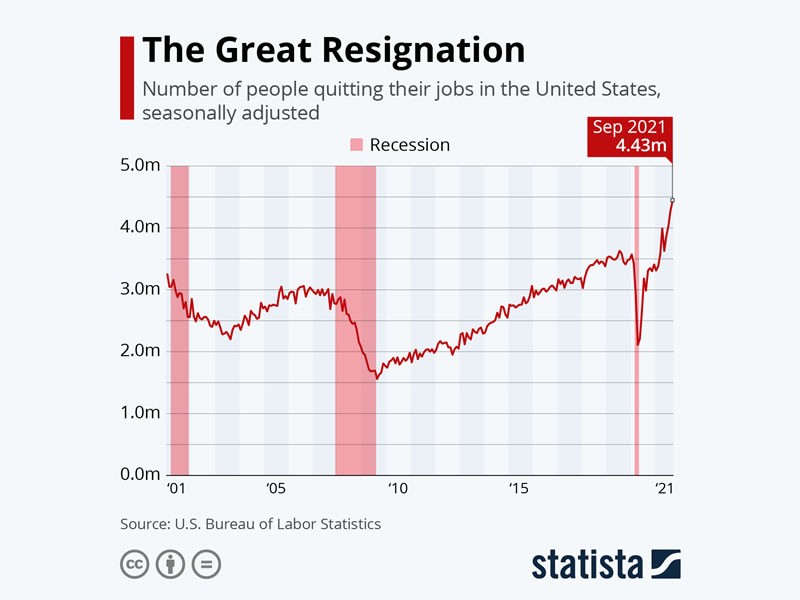Insight Blog
Agility’s perspectives on transforming the employee's experience throughout remote transformation using connected enterprise tools.
7 minutes reading time
(1463 words)
The great resignation is here! Seven things bosses should do to make brilliant staff stay
Organizations are trying to attract and keep employees, so many of them are offering large sign-on incentives and greater compensation. Is your business prepared?
We're moving toward a new post-pandemic era. The old managerial practice of dictating terms to employees is coming to an end. Businesses have been compelled to offer free training to their employees as part of a continuing war for talent. Organizations are trying to attract and keep employees, so many of them are offering large sign-on incentives and greater compensation.
What is the great resignation?
It is sort of a workers' revolution and uprising against lousy bosses and tone-deaf corporations who refuse to pay fair wages and exploit their employees. Millions of employees voted with their feet and walked out of their jobs. Most of them have left their jobs without a backup plan in place. They don't want to be victims any longer. The quitters are making a strong, positive, and self-affirming statement by declaring that they will no longer tolerate the abusive behavior.
Why is the great resignation happening?
About 4 million Americans have resigned from their jobs in 2021. Most of the resignations were registered in April. After that, we have seen an unusually high number of resignations per month. There were 10.9 million jobs available at the end of July. It is a new record. We are witnessing a tidal flood of resignations, but what can employers do to retain their employees?
You need to understand the source of these alarming figures to address them.
The main factors that are great resignation:
- -No flexibility in the work schedule
- -Ignoring employees wellbeing
- -Lack of benefits
- -Frequent organizational changes
- -Stress and burnout
Great resignation statistics in the United States
The statistics from 2020 and 2021 show that employees between the ages of 30 and 45 experienced the biggest increase in resignation rates. Astonishingly, their average resignation rate increased by more than 20%. You may expect that younger employees are more likely to leave; however, the research paints a different picture. The resigns from young workers (20-25 years of age) declined as compared to last year. The decrease in demand for entry-level workers can be the reason for this decline. Similarly, the resigns from older workers (60 to 70 years of age) also decreased in comparison to last year.
A significant disparity in turnover rates among organizations in specific industries was also noticed. The numbers have shown that the resignations in some industries (i.e., manufacturing and banking) have decreased marginally. On the other hand, about 3.6 percent more healthcare workers have left their employment than the previous year. Likewise, resignations in technology have grown by 4.5 percent. The Harvard Business Review reports that employees who worked in fields that had witnessed dramatic increases in demand as a result of the pandemic had higher resignation rates, which likely led to greater workloads and burnout.
How can employers retain employees in 2021?
The Great Resignation is impacting medium and small organizations all around the world. Here's how you can keep your organization from losing its top staff.
Be competitive
All companies are increasing their influence as you strive to keep staff in your local market. Keep a watch on local job posts to ensure that your salaries, hours, and benefits aren't being matched by the company next door. If you want to retain talented employees, you may need to increase payroll expenditures. Do not worry, and this should be easily recovered by eliminating the high costs of recruitment. It can also save the resources that you spend on training and lost productivity.
Focus on flexibility
About 41% of employees plan to leave their workplace in 2021. On the other hand, the ones who want to stay on the job (73%) have asked for flexible work alternatives. The COVID-19 pandemic has brought suffering, but it has also brought new opportunities. However, some companies are not ready to accept the new workplace and styles, so remote work is beyond comprehension. While many companies were hesitant to operate from anywhere prior to the pandemic, the COVID-19 epidemic proved that it could not only be done but that it could be done productively. The notion of returning to the 9 to 5 commuting routine is intolerable for many workers. You can consider whether you can continue to use a remote or hybrid solution to retain employees. Employers should consult their employees about their preferences and see if the organization can accommodate them.
Try to avoid burnout at all costs
The lockdowns were the reason why many workers discovered just how burned out they were on the job. They were facing severe exhaustion. More importantly, you need to know that absence, irritation, blunders, and depression all lead to employee burnout. If you find formerly high-performing employees making frequent mistakes, not participating in discussions, or appearing dissatisfied, they are about to be burned out. You can solve this by talking to them about the difficulties they're having. After that, you can take action to help them reclaim their job happiness.
Make planning a top priority
The pandemic has resulted in so much uncertainty, it may seem premature to talk about the future, but retaining your talented employees and avoiding the great resignation need immediate attention. We are currently in a difficult period for businesses and employees. However, the great resignation will not remain indefinitely. You can start designing a career path for staff members if it is possible. Alternatively, you can get it back on track if it was derailed during the pandemic. Invest in their future training and development so they can see a future with your company.
Do not stop the job hunt
Companies need to treat current workers with the same enticing, meticulous care they provide to prospective hires. It can work, but it may seem like it is like those corny relationship therapists. They suggest you treat your wife as if you're recently married. However, rather than being distracted by some flitting youthful work profile, it would be good to see more companies commit to delivering the employees some flowers. It means the companies need to appreciate their current employees and give them some additional money and grant them more annual leaves and repeat the process on a yearly basis.
Focus on boosting morale
It is true that you and your team are working hard, so try to arrange some events that can boost the morale of your employees. It can be tricky, but they're well worth the time and effort. Consider modest tokens of appreciation, such as complimentary lunches or dinners. Alternatively, you can go for goodies in the break room (or virtual deliveries). You can arrange a paid afternoon or a day of wellness time for employees. It is also possible to make Fridays a meeting-free day. It can work efficiently if your remote team spends all of their time online. You can take a late start on Mondays and reduce working hours on Fridays. Try to say "thank you" for completing tasks and give gifts if it is possible.
The great resignation UK
It is shocking news, but about a quarter of workers are actively preparing to resign from their current jobs in the coming months. It is a part of a "great resignation," which is primarily caused by the pandemic's high number of openings and exhaustion. A survey from the UK has shown that about 69 percent of participants were confident in their ability to move to a new job in the next months. At the same time, about 24 percent are ready to change their jobs in the next 3-6 months.
There is no point in organizing focus groups to determine whether employees would prefer subsidized sandwiches or meditation classes. Now all companies need to be serious about giving workers a living wage and taking care of their well-being. They also need to maintain safe and healthy working conditions and work hours that are humane. As a result, they would prefer to work in order to have enough money and free time to live. This approach can be applied to avoid great resignation in all types of jobs.
Conclusion
Communication may be the key to wreathing the storm of the Great Resignation. Always maintain strong communication with your employees at all levels, including teams and individuals. If you don't think they'll be honest with you face to face, give anonymous questionnaires to measure work satisfaction. They understand their needs and what they need to keep working in your organization. Your responsibility is to read their responses and try your best to solve the issues.
Categories
Blog
(2726)
Business Management
(333)
Employee Engagement
(213)
Digital Transformation
(185)
Growth
(124)
Intranets
(121)
Remote Work
(61)
Sales
(48)
Collaboration
(43)
Culture
(29)
Project management
(29)
Customer Experience
(26)
Knowledge Management
(21)
Leadership
(20)
Comparisons
(8)
News
(1)
Ready to learn more? 👍
One platform to optimize, manage and track all of your teams. Your new digital workplace is a click away. 🚀
Free for 14 days, no credit card required.

















